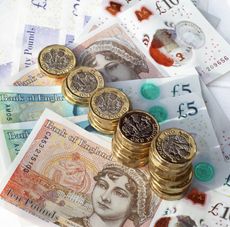Klarna to start charging late payment fees – we explain what you need to know
Klarna is the latest buy now, pay later provider to introduce late fees. We explain how the new fees will work and how to avoid them


Klarna customers will have to pay a £5 fee if they miss payments from 16 March.
The buy now, pay later (BNPL) service lets you spread the cost of a purchase and is available as a payment option at many online retailers.
And until now, Klarna had been one of the only main BNPL providers to not charge any late payment fees - although late payments can be reported to credit agencies and ultimately affect your credit score.
Other BNPL providers Clearpay and Laybuy already charge a late fee of £6.
The new change for Klarna customers comes shortly after the government consultation to bring buy now, pay later services into regulation went ahead - potential new rules will give borrowers certain rights and protections.
We explain how the new fees will work and how to avoid them.
How Klarna’s late payment fees will work
- Klarna’s new late payment fees will be charged from 16 March.
- A late payment fee will be up to £5. The standard fee will be £5 and will apply to orders of £20 or more. But you won't be charged more than 25% of your order value as a fee – so if you buy something for £5, the late fee will be capped at £1.25, for example.
- Customers will have to pay the fee after a seven-day grace period. So if you miss a payment, you'll have a week to pay it before being charged a fee. And Klarna will send a minimum of four reminders before actually charging a fee.
- You'll only be charged a maximum of two late fees for the same order - so if you miss several payments for an order then you can’t be charged more than £10.
- No interest will be charged on missed payments.
- If you do miss payments, you may have your access to Klarna reduced.
- If payments continue to be missed over a period of several months, Klarna uses debt collection agencies to get in contact with customers who it can't get hold of.
How to avoid Klarna’s late payment fees
- Keep on top of your payments - it’s the obvious answer.
- Contact Klarna as soon as possible if you’re struggling pay. You can do so via its in-app online chat or by calling 0808 189 3333 to see what help it can offer.
- If you use the 'Pay later in 30 days' option or have a Klarna Financing agreement, turn on the Autopay toggle - it ensures you enter your bank details, create a direct debit mandate and pay on time.
- Until 27 April, late fees will be waived for those who take a 'financial awareness' test in the Klarna app. The provider says this is a way of using the new fees to incentivise financial education.
Look After My Bills Newsletter
Get the best money-saving tips, tricks and deals sent straight to your inbox every week. Make sense of your money in partnership with The Money Edit.
Katie is staff writer at The Money Edit. She was the former staff writer at The Times and The Sunday Times. Her experience includes writing about personal finance, culture, travel and interviews celebrities. Her investigative work on financial abuse resulted in a number of mortgage prisoners being set free - and a nomination for the Best Personal Finance Story of the Year in the Headlinemoney awards 2021.
-
 Three energy firms pay £8m in switching compensation - has your provider paid out?
Three energy firms pay £8m in switching compensation - has your provider paid out?More than 100,000 customers have received compensation after changing providers, but is now a good time to switch energy suppliers?
By Tom Higgins Published
-
 Save £300 on your supermarket shop with cashback accounts
Save £300 on your supermarket shop with cashback accountsBanks, credit card companies and cashback sites are all offering cashback on your supermarket shop, but can you use them all to max out your savings?
By Vaishali Varu Published
-
 Save £300 on your supermarket shop with cashback accounts
Save £300 on your supermarket shop with cashback accountsBanks, credit card companies and cashback sites are all offering cashback on your supermarket shop, but can you use them all to max out your savings?
By Vaishali Varu Published
-
 More than 150,000 grandparents missing out on £1,500 state pension uplift: how to claim
More than 150,000 grandparents missing out on £1,500 state pension uplift: how to claimGrandparents who provide childcare by looking after their grandchildren could be missing out on valuable state pension money worth thousands. We look at how much extra you could get and if you’re eligible
By Stephanie Baxter Published
-
 Can you reclaim bank charges?
Can you reclaim bank charges?If you’ve incurred bank charges over the years, these can add up to hundreds of pounds – but can you get your money back? We look at whether you can make a claim and how to do it
By Stephanie Baxter Published
-
 HSBC extends deadline for customers to secure bigger interest-free overdraft
HSBC extends deadline for customers to secure bigger interest-free overdraftHSBC customers now have until 10 May to increase their interest-free overdraft limit from £25 to £500. First Direct, Lloyds and Nationwide also offer similar support. We explain everything you need to know
By Katie Binns Last updated
-
 New banking hub locations revealed - is there one near you?
New banking hub locations revealed - is there one near you?The rise of banking hubs is in response to a stream of local branch closes. With more planned to launch soon, we look at what services they offer and where you can find one
By Stephanie Baxter Published
-
 April 2023 premium bond winners revealed - are you a millionaire?
April 2023 premium bond winners revealed - are you a millionaire?Two premium bond holders have won £1 million each this month and there are many other prizes for another 5,018,742 winners in April. We look at how to find out if you’ve won
By Stephanie Baxter Published
-
 Get more for your money with a stocks and shares ISA
Get more for your money with a stocks and shares ISAA stocks and shares ISA could grow your money faster than a cash ISA. But what is it exactly and who is it suitable for?
By Ruth Emery Published
-
 Help to Save scheme extended – act now for £1,200 bonus
Help to Save scheme extended – act now for £1,200 bonusThe government has extended the Help to Save scheme - we explain how it works and who is eligible
By Kalpana Fitzpatrick Last updated